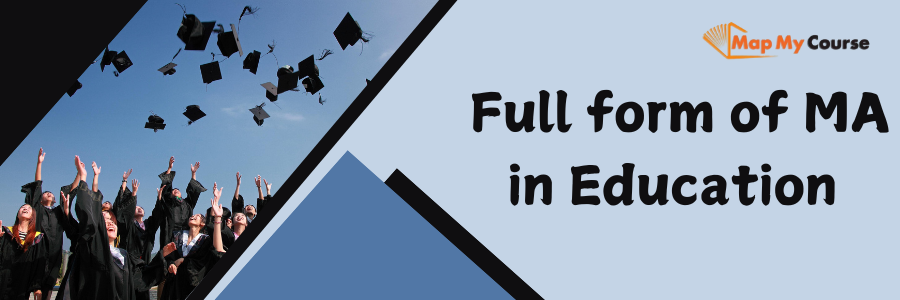Key highlights of MA Course
MA Course Details | |
| Full form | Master of Arts |
| Degree level | Postgraduate or Master degree |
| Field of studies | Arts and Humanities |
| Duration | 2 Years |
| Mode | Regular MA , Online MA and Distance MA |
| Specialization | · MA in English· MA in History· MA in Psychology· MA in Sociology· MA in Philosophy· MA in Social Work· MA in Theatre· MA in Studio Art· MA in Archaeology· MA in Economics· MA in Political Science· MA in Journalism· MA in Education· MA in Environmental Studies· MA in Human Resource Management· MA in Legal Studies |
| Eligibility criteria | · Bachelor’s degree from any recognized university.· Minimum aggregate score of 50 %. |
| Entrance exam | Common Entrance Test (CET) |
| Fees: | Rs. 15 K- Rs. 3 Lakh |
| Career opportunities | · Content Writer· Teacher· Psychologist· Sociologist· HR |
What is the full form of an MA in Education?

The full form of MA is Master of Arts, which is a PG degree in the field of Arts and humanities. It’s a two-year program designed to enhance your knowledge in areas like history, politics, public administration, journalism, and more.
Only those who have completed their bachelor’s degree are eligible to apply for an MA program, either full-time or through distance learning. MA offers a specialized course of study that can help you excel in various fields within the humanities and social sciences.
Is Pursuing an MA worth it?
Yes, Pursuing an MA is totally worth it! You can become a real expert in something you love. With an MA, you’ll learn a lot more, discover new things, and get better at what you do. It will also open up doors to exciting new career opportunities. An MA can boost your earning potential, give you access to leadership positions, and even pave the way for further studies like a PhD.
MA requires dedication and hard work, but it’s worth it. It’s like investing in your future. Pursuing an MA program will help you grow and succeed in your career.
MA Course Duration and Structure
MA course Fees
Admission process for the MA program
Step 1: Check if you’re eligible: Make sure you meet the mentioned eligibility criteria.
Step 2: Find the right MA program: Look for MA programs that match your interests and career goals. Think about the specialization, the university’s reputation, and where it’s located.
Step 3: Gather your documents: Get ready things like documents related to your education qualification, letters from teachers, a personal essay, and maybe some test scores.
Step 4: Fill out the application: Complete the application form online or on paper.
Step 5: Take Entrance exams (if required): Some universities might ask you to take tests like the GRE or GMAT.
Step 6: Prepare for interviews: Practice answering questions about yourself and why you want to do an MA.
Step 7: Wait for a decision: The University will tell you if you’re accepted.
Step 8: Enroll if you’re in. If you’re chosen, follow the university’s instructions to join the program, pay tuition, and finish any necessary paperwork.
Remember to check the specific requirements and deadlines for the universities you’re interested in.
Eligibility Criteria for MA Courses
- You must have completed a bachelor’s degree from a recognized university.
- Most universities require a minimum aggregate score, typically around 50-60% in your bachelor’s degree.
- Some MA programs require you to take entrance exams like the Common Entrance Test (CET) or university-specific entrance exams.
- If the MA program is taught in English, you might need to demonstrate English language proficiency.
- Some specialized MA programs may prefer candidates with relevant work experience.
MA course specializations
| Specialization | What will you learn ? |
| MA in English | Literature, Language, How to Write Creatively, American Literature, British Literature, Studying Literature |
| MA in History | Ancient History, Medieval History, Modern History, Indian History, World History |
| MA in Psychology | Clinical Psychology, Counseling Psychology, Industrial-Organizational Psychology, Developmental Psychology, Social Psychology |
| MA in Sociology | Rural Sociology, Urban Sociology, Social Work, Social Research Methods, Sociology of Development |
| MA in Philosophy | Ethics, Metaphysics, Logic, Philosophy of Mind, Philosophy of Science |
| MA in Social Work | Social Work Practice, Social Policy Analysis, Community Organizing, Social Work Research, Child Welfare |
| MA in Theatre | Acting, Directing, Playwriting, Theatre History, Stage Design |
| MA in Studio Art | Painting, Sculpture, Photography, Printmaking, Graphic Design |
| MA in Archaeology | Archaeology Theory, Fieldwork Methods, Ancient Civilizations, Museum Studies, Cultural Heritage Management |
| MA in Economics | Microeconomics, Macroeconomics, Development Economics, Econometrics |
| MA in Political Science | International Relations, Comparative Politics, Public Policy, Political Theory |
| MA in Journalism | Print Journalism, Broadcast Journalism, Digital Journalism, Investigative Journalism |
| MA in Education | Educational Administration, Curriculum Development, Educational Psychology, Special Education, Early Childhood Education |
| MA in Environmental Studies | Environmental Science, Environmental Policy, Sustainable Development, Climate Change Studies |
| MA in Human Resource Management | Employee Relations, Talent Acquisition, Performance Management, Compensation and Benefits, Organizational Development |
| MA in Legal Studies | Business Law, Corporate Law, International Law, Intellectual Property Law, Environmental Law |
MA course syllabus
| MA in English Syllabus | |
| Semester I | Semester II |
Poetry I Drama I Language and Linguistics Seventeenth Century Drama | Poetry II Drama II (Shakespeare) Fiction I Indian Literature in English |
| Semester III | Semester IV |
Poetry III Drama III Literary Criticism I Indian Literature II American Literature | Fiction II Literacy Criticism II American literature II New Literature in English European literature in English |
| MA in History Syllabus | |
| Semester I | Semester II |
Social and Cultural History of India up to A.D 1526 Social and Cultural History of Tamil Nadu From Sangam Age to A.D 1565 Modern World 1800 – 1920 A.D. History of Indian Economy | Social and Cultural History of India from A.D 1526 to A.D 1773 Social and Cultural History of India From A.D 1773 to A.D 2000 Political Structures in India Contemporary World 1920- 2000 A.D |
| Semester III | Semester IV |
History of World Civilizations – Ancient Period Society and Culture of Medieval India Indian Polity and Economy in the Sultanate Period ( 1200 – 1526 A.D ) Colonialism and Nationalism in Modern India | History of World Civilizations – Medieval and Modern Period India’s Foreign Policy – Since A.D 1947 Political and Administrative History of Modern India ( 1858 – 1964 ) Economic, Social and Cultural History of Modern India |
| MA in Psychology Syllabus | |
| Semester I | Semester II |
Applied Psychology Cognitive Psychology Emotional Intelligence Experimental Psychology | Biological Bases of Behavior Positive Psychology Research methods in Psychology Practicals |
| Semester III | Semester IV |
School Psychology Criminal and Forensic Psychology Mental Abilities Human Development | Indian Psychology Development Psychology Psychology of Advertising Development of Social Psychology |
| MA in Economics Syllabus | |
| Semester I | Semester II |
Microeconomics Macroeconomics Statistics Research Methods | Open-Economy Macroeconomics Public Economics International Trade and Finance Economics of Corporate Finance |
| Semester III | Semester IV |
Development Economics Economics of Social Sector Statistics II Dissertation | Behavioral Economics Economics of Informal Sector Financial Markets and Institutions General Equilibrium and Welfare Economics |
| MA in Political Science Syllabus | |
| Semester I | Semester II |
· Indian Political Thought · Human Rights in India · Western Political thoughts · Political Theory | Modern Political Analysis Modern Political Theory Public Administration International Issues |
| Semester III | Semester IV |
Indian Political System India in world affairs Contemporary Political Thoughts Administrative Theory | Ethics and Political Foreign Policy of India International Law Project Report |
Different modes to pursue an MA program
- Regular MA: This is the traditional way to get an MA. Students go to classes and learn from teachers in person. It’s best for people who can dedicate two years to their studies.
- Distance MA: This is for working people who can’t go to regular classes. It’s flexible and lets students learn at their own pace and from anywhere with the internet. Distance MA is just as good as regular MA because it’s approved by the University Grants Commission.
- Online MA: Similar to distance MA, online MA programs are for working professionals. They offer online lectures, virtual classrooms, and online exams. This is the most flexible option for students who can’t go to regular classes.
The best mode of MA course for you depends on your personal situation, how you like to learn, and your career goals. Think about your work, your finances, and how you prefer to learn when making your decision.
Career opportunities after completing MA program
Content Writer | Philosopher |
Teacher | Government Official |
Psychologist | Counselor |
Sociologist | Policy Analyst |
HR | Social worker |
Top University/colleges for MA with fees
Institution Name | Fees |
Hindu college | 48,500/- |
32,432/- | |
Chandigarh University | 70,000/- |
Ramjas College | 30,270/- |
Manipal university | 1,40,000/- |
Lovely professional University | 76000/- |
Sikkim Manipal University | 75000/- |
Takeaway
We hope this Blog has given you all the important information you need about the MA full form and full details of the MA course. We’ve talked about different things, like what you need to be eligible, the jobs you can get, popular specializations, and top universities.
Whether you just graduated or are already working, getting an MA can be a great investment in your future. By thinking carefully about your goals, interests, and career dreams, you can choose the right MA program that will help you succeed.
FAQ
Q1. What is the full form of an MA in Education?
The full form of an MA is a Master of Arts, which is a postgraduate degree of 2 years in the field of Arts and Humanities.
Q2. Is pursuing an MA worth it?
Yes, pursuing an MA is totally worth it! It will help you advance your career.
Q3. Can I pursue an MA online?
Yes, you can pursue an MA online. Many reputed universities provide Online MA.
Q4. What are the fees for the MA course?
The fees for MA range between 15,000 and 3 lakh in India.


















